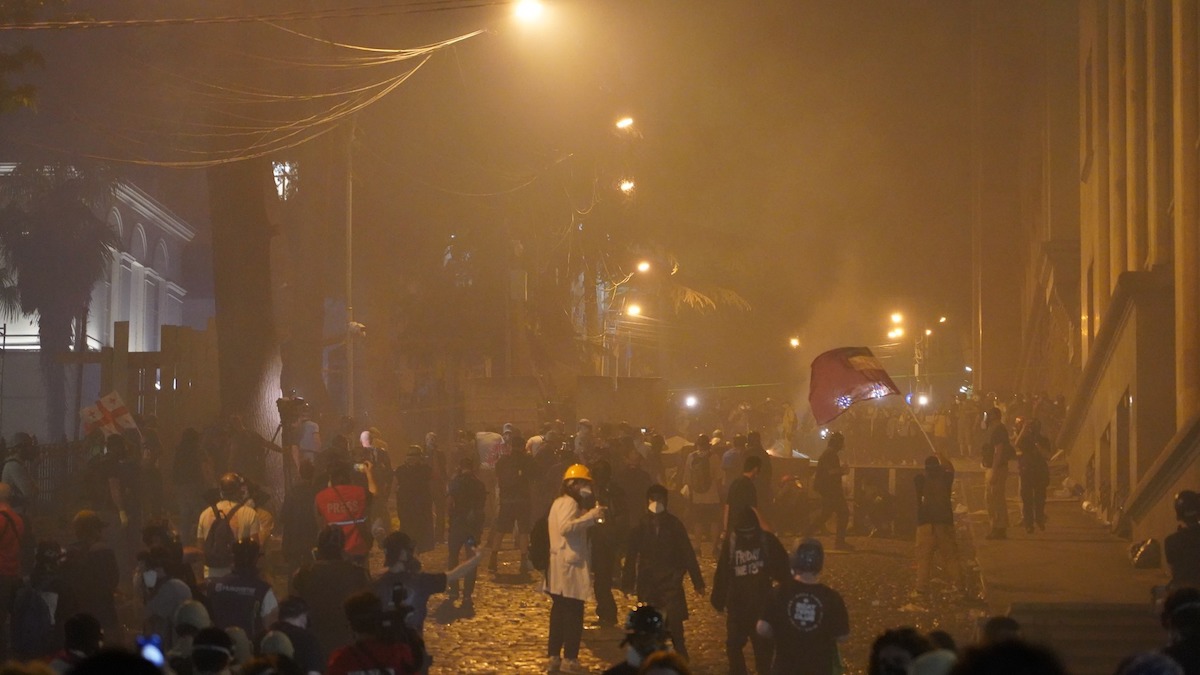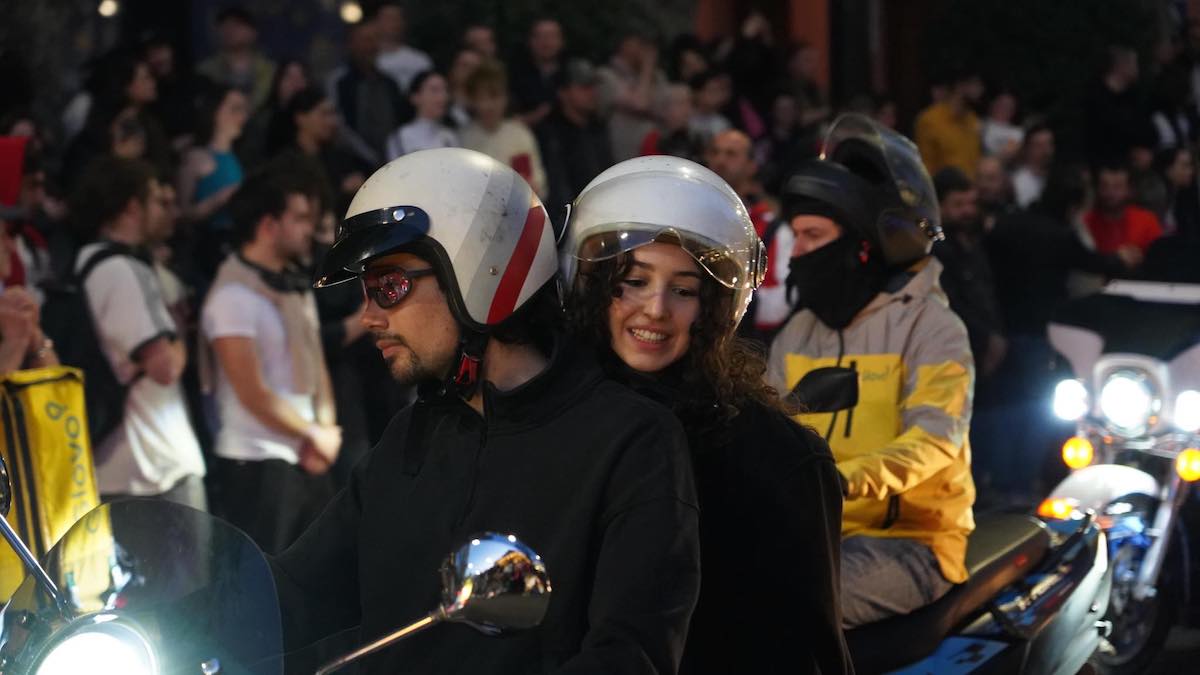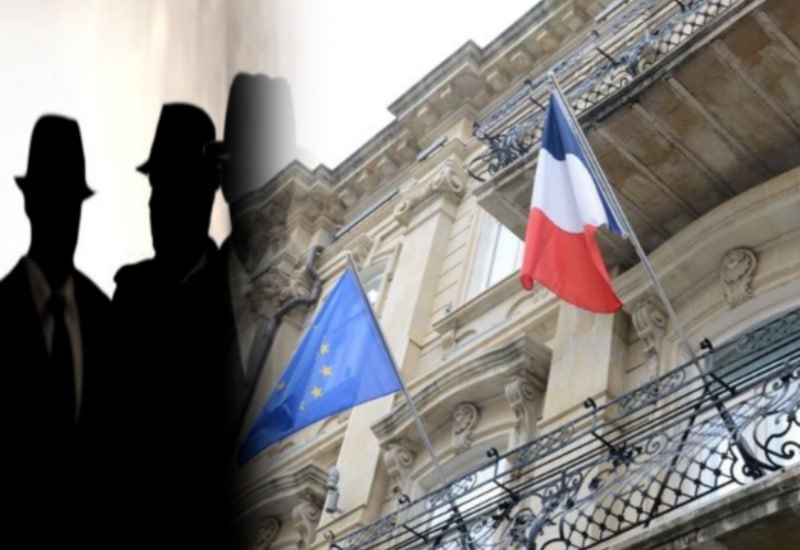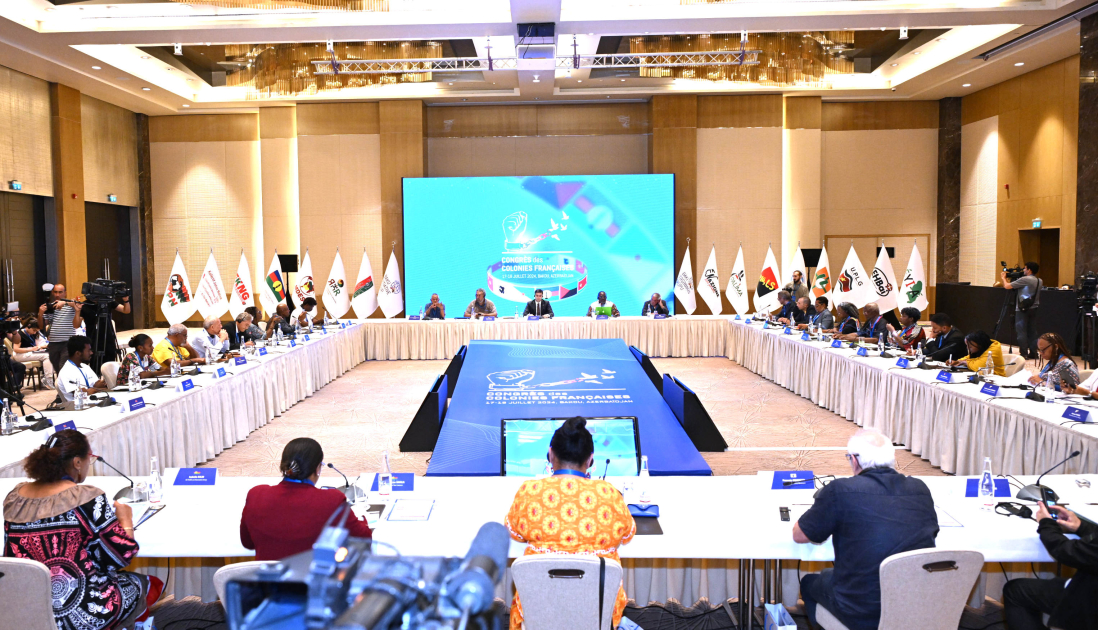Бывший первый заместитель председателя правительства Московской области Илья Бронштейн в пятницу был задержан правоохранительными органами. Его подозревают в получении взятки в сумме 25 миллионов рублей. https://t.co/jVuoWPMtvi
— Радио Свобода (@SvobodaRadio) September 13, 2024
Month: September 2024
The Hill
Pavel Durov’s arrest sparks global tech industry concerns https://t.co/iOAkIBl2Nn
— Michael Novakhov (@mikenov) September 13, 2024
With this fresh spirit;
sustainable #development at the #Crossroads is the only way forward for #Armenia
and for enhanced #peace prospects in the region. #SouthCaucasus
***
4/4
— Mariamme Nadjaf (@MNadjaf) September 13, 2024
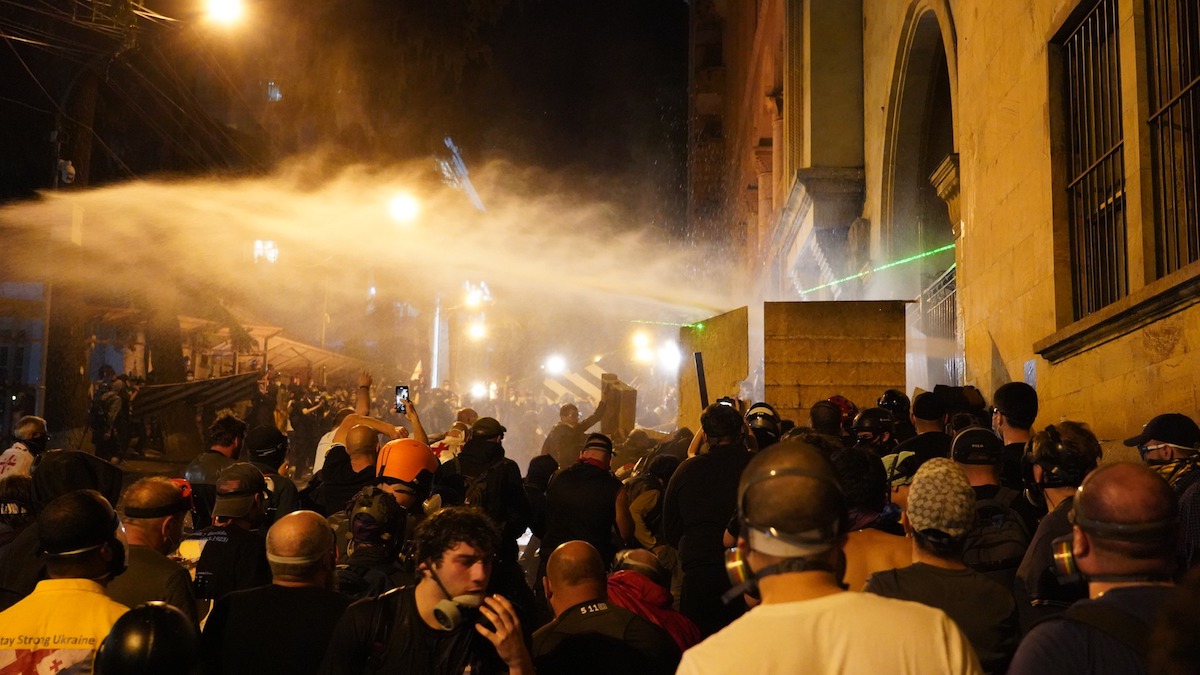
Arrested protesters in Georgia
According to the Georgian Young Lawyers’ Association (GYLA), a thorough investigation into alleged abuse of power by law enforcement during the spring protests against the “foreign agent” law in Tbilisi has not yet been conducted. Meanwhile, the court has applied the strictest measure of detention to nine protest participants.
“GYLA is monitoring the criminal cases of individuals arrested during the protests against the ‘foreign agent’ law. Based on open sources, the organization has identified criminal cases against nine people.
All these cases are being heard by the Tbilisi City Court, where the strictest measure of detention has been applied to each defendant,” the statement reads.
The statement also highlights concerns over the lack of a thorough investigation into alleged abuses of power by law enforcement and the failure to hold those responsible accountable.
GYLA will continue to monitor the cases of the protest participants and keep the public informed.
Arrested protesters in Georgia
What’s important to know about Georgia’s ‘foreign agents’ law?
- The “Law on Transparency of Foreign Influence”, initiated by the ruling Georgian Dream party, was passed by Parliament on May 28, 2024. The legislation establishes a special registry for “foreign agent organizations,” defined as entities where more than 20 percent of funding comes from foreign grants. In a small and relatively poor country like Georgia, this effectively includes nearly all non-governmental organizations.
- The Parliament adopted this law despite massive protests, persistent calls from Georgia’s Western partners, and the opinion of the Venice Commission of the Council of Europe.
- After the passage of the law, the US announced the first package of sanctions against the “Georgian Dream” government. Secretary of State Antony Blinken warned of a “comprehensive review of US-Georgia cooperation.”
- The European Union also took retaliatory measures. In early July, the EU halted €30 million in aid to Georgia and warned of additional measures to come. Senior EU officials have repeatedly indicated that this law distances Georgia from the EU.
- On July 11, the U.S. House Committee on Foreign Affairs passed the Megobari Act, which imposes sanctions on those involved in passing the “foreign agents” law.
The Georgian government’s main argument is that similar laws exist in the U.S. and several European countries, including France. According to Georgian Dream, every country has the right to protect itself from foreign influence and demand transparency from its organizations.
However, this comparison is inaccurate because:
The American law FARA (Foreign Agents Registration Act), to which Georgian Dream refers, was enacted in the U.S. in 1938, before World War II, and aimed to protect the American public from Nazi propaganda. Neither then nor now did FARA apply to America’s allies and friendly countries.
In France, the law on “Foreign State Influence” includes a specific list of countries to which the law applies. This list comprises countries whose influence France considers a threat, including Russia, China, Turkey, and Iran. The French version also specifically states that this law does not apply to EU countries. The Georgian version lacks such provisions. Consequently, this law directly impacts organizations funded by the U.S. and the EU—friendly and partner countries that support democratic processes and numerous vital projects in Georgia, ranging from healthcare and infrastructure to strengthening civil society.
Furthermore, FARA stipulates that the law does not apply to media or NGOs, only to lobbying organizations. The Georgian version does not have this clarification.
Overall, the Georgian law is similar to the Russian law, which primarily affected media and the NGO sector. As a result, all non-governmental and media organizations not controlled by the Kremlin have been shut down in Russia. Hence, the Georgian law has been dubbed the “Russian law.”
It’s also important that this law contradicts EU legislation. When a similar law was adopted in Hungary, it was annulled by the European Court of Human Rights because it was directly aimed at silencing the media and oppressing NGOs.
The Communications Commission (ComCom) this week upheld two complaints filed by the ruling Georgian Dream party against opposition-leaning TV stations. In one of the cases, the appeal concerned the refusal of some channels to broadcast the party’s advertisement, which, according to these channels, contains “hate speech” and violates the law. In another case, the appeal concerned the placement of individual political ads by parties currently in coalition with other parties, as well as the allegedly unequal distribution of airtime for free political advertisements.
ComCom’s Decision on Refusal to Air GD’s Ad
On September 13, ComCom issued a protocol of administrative violations against the opposition-leaning TV Pirveli and Formula TV for not broadcasting the ruling Georgian Dream party’s political ad. A day earlier, ComCom fined Mtavari TV GEL 5,000 (about USD 1,800) for the same reason, and that decision was also upheld today by the Tbilisi City Court.
Both TV Pirveli and Formula TV initially aired GD’s political advertisement, but after a few days took it off the air, claiming that the video contained “hate speech” and violated the Broadcasting Law or the Advertising Law of Georgia. GD appealed to ComCom with a request to issue a protocol of administrative violations against these channels, which the Commission granted.
According to ComCom, during a public meeting today, the Commission listened to arguments from all sides and determined that the ad “does not contain hate speech or incitement violence”. It noted: “The video produced by the campaign unit is intended to present the pre-election vision of the political union,” adding: “Therefore, the video presented does not violate the requirements of the legislation in force and the broadcaster was obliged to broadcast it.”
In the case of Mtavari TV, the station appealed to the Tbilisi City Court against ComCom’s decision to fine it on September 12. The station’s lawyers argued during the hearing that according to the Georgian Broadcasting Law, the political party doesn’t have the right to portray in a negative light anyone who doesn’t represent another political entity participating in the upcoming elections. In this particular video, CSO representatives are shown in black with the words “Say no to moral degradation” written over them in red [See the frames here].
Despite Mtavari TV‘s claims, the Court decided to uphold ComCom’s decision to fine it. The station plans to challenge this ruling in the Appeal’s Court.
ComCom’s Decision on Individual Ads, Airtime Distribution
On September 12, ComCom upheld the GD’s complaint against the channels Mtavari TV, Public Broadcaster, TV Pirveli and Formula TV and issued a protocol of administrative violations against these channels for their decision to broadcast individual political advertisements of parties that intend to participate in the upcoming elections in coalition with others. The Commission also stated that due to the precedential nature of the issue, it would appeal to the court to exempt the broadcasters from the obligation to pay fines.
The GD’s appeal claimed that one electoral subject cannot place an advertisement in favor of another electoral subject within the airtime allotted to it. Currently, the situation is such that the parties “European Georgia” and “Yes to Europe” have publicly declared that they will run in the elections in coalition with the “United National Movement”, and the political association “Citizens” has announced a coalition with “Lelo”. Therefore, GD believes that it is illegal for these individual parties to broadcast separate free political advertisements, because it serves to support the parties with which they are in coalition.
GD also claimed that on Mtavari TV and TV Pirveli, the time allotted to political advertisements of “Unity – National Movement” and “Ahali” is more than the time allotted to other parties, allegedly violating the Electoral Code. ComCom granted both requests of the Georgian Dream party.
In a briefing held by Tamar Kordzaia, a member of the “Unity to Save Georgia” coalition, she emphasized that the problem with ComCom’s decision lies in the fact that none of the above-mentioned parties have legally registered their decision to participate in the elections in a coalition and have until September 26 to form official unified lists. Before that date, they have the full right to revoke their publicly announced decision and participate in the elections separately, so if they do so, then ComCom’s decision to deprive them of their right to free political advertising will be unlawful.
Also Read:
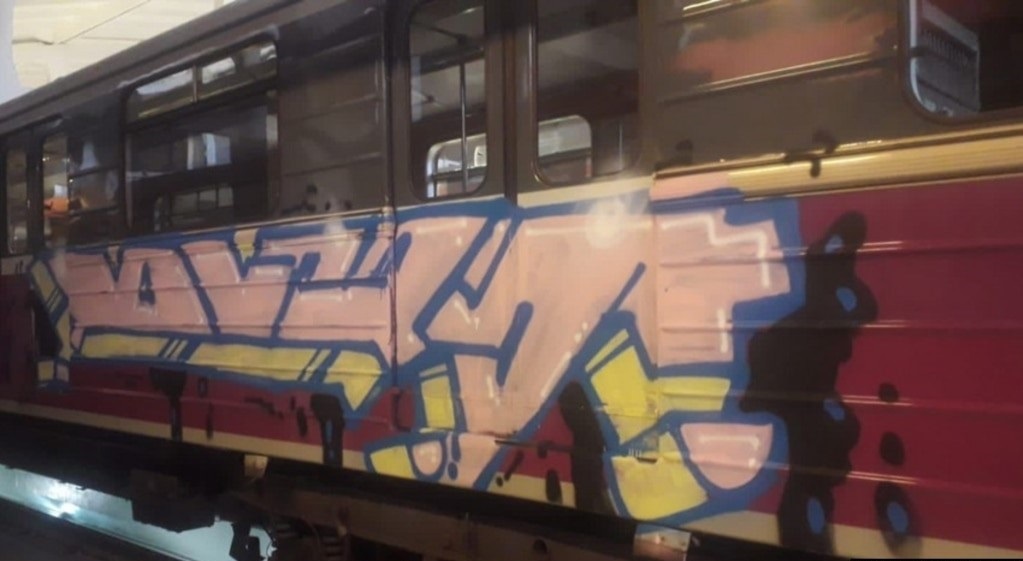
French graffiti artist sentenced in Azerbaijan
In Baku, a French citizen was sentenced to three years in prison for graffiti on metro cars. The French Ministry of Foreign Affairs issued a warning to its citizens, advising against travel to Azerbaijan unless absolutely necessary “due to the risk of arbitrary detention and unfair trials in a country whose judicial system offers no guarantees of independence or protection of rights.” The Azerbaijani Ministry of Foreign Affairs responded with a statement.
- Azerbaijan’s role amid the crisis of the global security and governance system. A view from Baku
- “Pashinyan’s proposal to Baku is not in Armenia’s best interest.” Opinion from Yerevan
- Azerbaijan: Arrested economist on hunger strike for 90 days
What happened?
On September 10, the Narimanov District Court in Baku announced the verdict for three foreigners who had entered a depot and painted graffiti on Baku metro cars.
The sentence was handed down to French citizen Clerc Theo Hugo, New Zealand citizen De-Saint Quentin Ismael, and Australian citizen Han Paul.

According to Turan, lawyer Elchin Sadigov said that the court viewed the graffiti, which had no political message, as “hooliganism” that led to significant consequences—”damage to someone else’s property.”
The French citizen received a three-year prison sentence.
The other two were fined 6,800 manats (around $4,000).
The lawyer pointed out that the damage had been fully paid for, including compensation for the train’s downtime.
The defendants admitted to creating the graffiti but said they didn’t do it out of hooliganism or to cause harm. They mentioned they had done similar things in other countries, where they were usually fined up to 400 euros.
The lawyer said they would appeal the court’s decision.
Two trials for the same act
The individuals were detained in March 2024.
Although Theo Clerc and the others were initially given administrative fines, a criminal case was later opened against them for the same act.
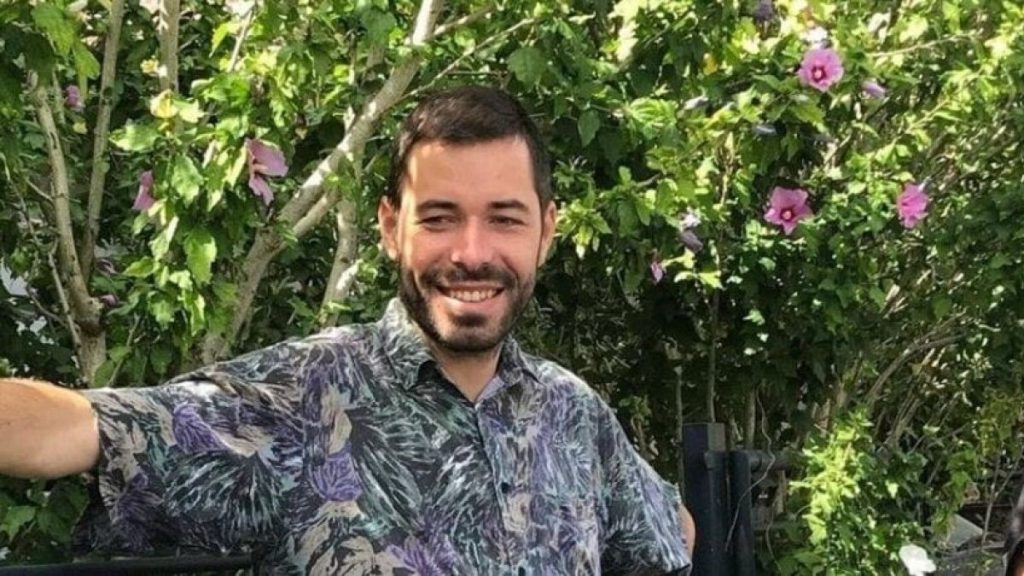
On April 2, the Yasamal District Court sentenced Theo Clerc to three months of arrest, while his friends were released under police supervision.
Theo Clerc stated that he had no intention of committing a crime or causing harm, claiming he was punished “because of the tension between Azerbaijan and France.”
“It’s wrong to punish me because of relations with France. I came here with friends as a regular tourist. I don’t represent France. We had not been to Azerbaijan before, so we decided to visit,” the 38-year-old graffiti artist said in court.
France calls for caution in traveling to Azerbaijan
France condemned the “arbitrary and blatantly discriminatory treatment” of its citizen Theo Clerc in Azerbaijan, who was sentenced to three years in prison for graffiti in the metro. “Meanwhile, the two other defendants received only fines for the same actions,” said a statement from the French Ministry of Foreign Affairs.
Immediately after Clerc’s detention, the French Embassy in Baku contacted Azerbaijani authorities to ensure consular protection for the French citizen, in line with the Vienna Convention on Consular Relations.
Embassy representatives attended all court sessions.
The French Ministry of Foreign Affairs reiterated its warning to French citizens, including those with dual citizenship, to avoid traveling to Azerbaijan unless absolutely necessary “due to the risk of arbitrary detention and unfair trials in a country where the judicial system does not provide guarantees of independence or rights protection.”
This warning was first issued on September 4.
Azerbaijan’s Foreign Ministry: “France ignores Azerbaijani legal procedures”
“Azerbaijan’s Ministry of Foreign Affairs finds France’s statements about ‘discrimination’ against French citizen Theo Clerc and the ‘unfair’ court decision, as well as France’s disregard for Azerbaijani judicial procedures, unacceptable. The accusations from France are unfounded,” said Ayhan Hajiyev, spokesperson for the Azerbaijani Foreign Ministry.
He stated that the verdict against the French citizen, who deliberately damaged state property, falls within the court’s jurisdiction, and the French side has no right to question this decision.
“The French citizen is imprisoned under the Azerbaijani Criminal Code article ‘Deliberate Destruction or Damage to Property’. It is noted that Theo Clerc had previously been fined in France for similar actions.
According to the investigation and court findings, the French citizen showed particular initiative and activity in committing the crime.
It was also found that his testimony during the court proceedings did not match the objective circumstances of the case. His insincere statements in court, claiming ignorance of such illegal actions in Azerbaijan despite previous fines for similar acts, as well as his lack of remorse, are factors contributing to the severity of his punishment compared to the other two individuals,” Hajiyev added.
Tensions between Azerbaijan and France
Relations between France and Azerbaijan have worsened since Paris supported Yerevan during the escalation of the Nagorno-Karabakh conflict. Armenia has started purchasing armored vehicles from France, and in February 2024, French Defense Minister Sébastien Lecornu stated that Paris was prepared to provide Armenia with air defense missiles if necessary.
In December 2023, French businessman Martin Ryan was arrested in Baku on charges of espionage. The same month, the Azerbaijani Foreign Ministry summoned the French ambassador to announce the expulsion of two diplomatic staff members.
In March 2024, Ali Nagiev, head of Azerbaijan’s State Security Service, claimed that France was arming Armenia and inciting it to a new war in Karabakh.
“Not satisfied with this, France is undermining Azerbaijan’s national security by engaging various individuals in secret cooperation through its intelligence representatives, creating a spy network,” he stated.
In April, the French Foreign Ministry recalled its ambassador from Baku.
In January 2024, the French Senate approved a resolution calling on the European Union to impose sanctions on Azerbaijan due to Baku’s actions in Karabakh.
In May, mass unrest erupted in New Caledonia (a French territory in the Pacific), with Paris accusing Azerbaijan of involvement. Azerbaijani officials rejected these claims as unfounded.
U.S. May Approve Ukrainian Strikes Deep in Russia, and Early Voting Begins https://t.co/OgFa4WX5Sp
— Michael Novakhov (@mikenov) September 13, 2024
The Tbilisi City Court has reportedly authorized the Anti-Corruption Bureau to access the personal data – bank account information, of the founders of the newly launched “Vote for Europe” movement and the organization itself. The movement’s lawyer, Kakha Kozhoridze, said on September 13 that the court decision is “absolutely unlawful,” adding that it will be appealed in the Tbilisi Court of Appeals.
President Salome Zurabishvili inaugurated the movement on July 11, bringing civil society representatives together to “protect Georgia’s European future, independence, and freedom.” Back then the movement said it’ planned ‘s mission is to reach Georgian citizens countrywide and the diaspora abroad with the “100 Days to Victory” campaign starting on July 18 and ending on election day, October 26. The campaign aims to mobilize pro-Western voters.
Kozhoridze argues that the Georgian legislation allows the Bureau to access such personal information only if a person it is investigating has a stated electoral purpose. Citing the law, lawyer Kozhoridze stresses that the movement and the individuals and movement in question cannot be considered to have a stated electoral purpose, as they do not participate in elections or seek power.
“What we are saying is that the law that regulates these matters, including the activities of the Anti-Corruption Bureau, says something very simple, that the Anti-Corruption Bureau can access the information of this or that person, only if this person is an entity with a stated electoral purpose. We ask a very simple question, are these individuals, for example, Nikoloz Shurghaia, Iva Chkonia [founders of the movement] or the organization “Vote for Europe” entities with a state electoral purpose?” Kozhoridze said.
According to him, “The answer to this question is in the law itself, which says that a person can have a declared electoral goal if he/she has declared about participating in the elections and coming to power. Nowhere have “Vote for Europe” and individuals made a statement about coming to power…Even if they made such a statement, we know that this elections …fully proportional. How can individuals participate in proportional elections? It is unimaginable.”
“In May, the lawmakers amended the law On Political Associations of Citizens which makes it a stronger lever than the Russian law and, frankly, the North Korean law. With this law, Georgia is moving towards a full-fledged dictatorship. Therefore, it is our direct constitutional right and duty to fight for the protection of our citizens,” said Khatuna Lagazidze, one of the founders of the movement.
At the September 13 press conference, Georgian Prime Minister Irakli Kobakhidze said that these changes were made under the UNM administration before 2012 and have been in effect since then.
He also defended the Anti-Corruption Bureau’s action, saying it “should have an opportunity to properly investigate all the information that may be connected to the illegal funding of the [political] parties.”
He also claimed that the “Vote for Europe” movement is “directly conducting agitation for the voters to support the collective UNM, the four parties,” referring to the UNM-led Unity to Save Georgia, the Strong Georgia coalition, the Coalition for Change and the For Georgia opposition party. He added that the movement wants the return of “the collective UNM” to the government.
The Prime Minister noted that “there are signs of illegal funding of the elections, but it will be determined by the relevant body.”
Also Read:

